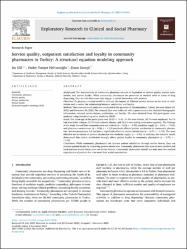| dc.contributor.author | Gül, İsa | |
| dc.contributor.author | Helvacıoğlu, Ender Tunçer | |
| dc.contributor.author | Saraçlı, Sinan | |
| dc.date.accessioned | 2023-12-13T06:25:47Z | |
| dc.date.available | 2023-12-13T06:25:47Z | |
| dc.date.issued | 2023 | en_US |
| dc.identifier.citation | Gül, İ., Helvacıoğlu, E. T., & Saraçlı, S. (2023). Service quality, outpatient satisfaction and loyalty in community pharmacies in Turkey: A structural equation modeling approach. Exploratory Research in Clinical and Social Pharmacy, 12, 100361. | en_US |
| dc.identifier.issn | 2667-2766 | |
| dc.identifier.uri | https://dx.doi.org/10.1016/j.rcsop.2023.100361. | |
| dc.identifier.uri | https://hdl.handle.net/20.500.12933/1837 | |
| dc.description.abstract | Background: The sustainability of community pharmacy services is dependent on service quality, patient satisfaction, and patient loyalty. While community pharmacies are perceived as medical units in terms of drug dispensing, they are also businesses that engage in social interaction with patients.
Objectives: To propose a certain model to evaluate the impact of different service factors on the level of satisfaction and to reveal the relationship between satisfaction and loyalty.
Methods: This cross-sectional study was conducted in the province of Afyonkarahisar, Turkey, between March 20, 2022, and December 30, 2022. The research data were collected with a questionnaire that included demographic information, selected service factors, satisfaction, and loyalty. The data obtained from 402 participants were analyzed using structural equation modeling (SEM).
Result: The mean age of the participants was 32.02 ± 11.81, 53.9% were female, 58.7% were employed, 54.1% had a bachelor's degree, 11.7% had a chronic disease, and 16.1% were taking medication regularly. The findings of the study showed that communication and attitude (β = 0.22; t = 3.90), medicine supply (β = 0.43; t = 7.62), and pharmacy environment (β = 0.26; t = 4.23) positively affected patient satisfaction in community pharmacies. Service promptness did not have a significant effect on patient satisfaction (β = 0.07; t = 1.18). The most effective service factor on patient satisfaction was medicine supply (β = 0.43). In addition, the research results determined that patient satisfaction strongly affects patient loyalty in community pharmacies (β = 0.72, t = 11.24).
Conclusions: While community pharmacies can increase patient satisfaction through service factors, they can increase patient loyalty by improving patient satisfaction. Community pharmacies that want to have satisfied and loyal patients should focus more on service factors. Community pharmacies should not only meet the medical expectations of patients but also meet their social expectations. | en_US |
| dc.language.iso | eng | en_US |
| dc.publisher | Elsevier Inc. | en_US |
| dc.relation.isversionof | 10.1016/j.rcsop.2023.100361. | en_US |
| dc.rights | info:eu-repo/semantics/openAccess | en_US |
| dc.subject | Community Pharmacy | en_US |
| dc.subject | Patient Loyalty | en_US |
| dc.subject | Patient Satisfaction | en_US |
| dc.subject | Service Quality | en_US |
| dc.subject | Tructural Equation Modeling (SEM) | en_US |
| dc.title | Service quality, outpatient satisfaction and loyalty in community pharmacies in Turkey: A structural equation modeling approach | en_US |
| dc.type | article | en_US |
| dc.authorid | 0000-0002-9419-4816 | en_US |
| dc.department | AFSÜ, Sağlık Bilimleri Fakültesi, Sağlık Yönetimi Bölümü | en_US |
| dc.contributor.institutionauthor | Gül, İsa | |
| dc.contributor.institutionauthor | Helvacıoğlu, Ender Tunçer | |
| dc.relation.journal | Exploratory research in clinical and social pharmacy | en_US |
| dc.relation.publicationcategory | Makale - Uluslararası Hakemli Dergi - Kurum Öğretim Elemanı | en_US |
















